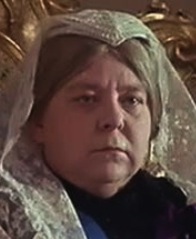Wednesday, December 31, 1975
THE ADVENTURE OF SHERLOCK HOLMES' SMARTER BROTHER. Music by John Morris. Written and directed by Gene Wilder. Running time: 91 minutes. General entertainment with the B.C. Classifier's warning: parents — occasional coarse language.
IT TAKES A GOOD DEAL of talent to create comedy that is of a piece, rather than a lot of pieces. Writer-director Gene Wilder doesn't have it yet.
Wilder is an alumnus of the Mel Brooks mob. He starred opposite Zero Mostel in the former TV gagman's breakthrough feature, 1968's The Producers. Brooks used him again in Blazing Saddles and Young Frankenstein (both 1974).
On the last named feature, Wilder was co-credited with the screenplay. Now he has struck out on his own, producing a comedy pastiche involving fiction's greatest consulting detective, The Adventure of Sherlock Holmes' Smarter Brother.
His story opens with Queen Victoria (Susan Field) entrusting the fate of Britain's Empire to her inept Foreign Secretary, Lord Redcliff (John Le Mesurier), who becomes tongue-tied and trips over the usual courtesies. Her Majesty is not amused.
Nor, I suspect, would Holmes' creator, Sir Arthur Conan Doyle, have been much amused. His mysteries were all carefully constructed and logically structured. Every piece was part of the whole.
Not so with Wilder. He knows how to assemble funny bits. He surrounds himself with funny people — notably Madeline Kahn and Marty Feldman, his Young Frankenstein co-stars, Leo McKern and Roy Kinnear (borrowed from the Richard Lester stock company), and Dom DeLuise (from American television).
What he hasn't been able to do is maintain any comic consistency. His film is a series of virtually independent sketches that tend to spotlight one or another of the stars, or a particular gag situation.
There is no plot to speak of. Wilder has cast himself as Sigerson, Sherlock's younger brother, who enjoys a hate-dislike relationship with the great detective. Nonetheless, when the elder brother (Douglas Wilmer) passes a case on, Sigerson takes it.
Unlike Young Frankenstein, which parodied specific films and a specific film style, Adventure is an elaborately mounted variety show. A more diffuse movie — its characters sing, dance, go to the music halls and even mount an opera — it is considerably less effective.
There are good bits. Dom DeLuise is outstanding in his turn as Cambetti, an opera star with a passion for villainy. Composer John Morris's counterfeit Korngold score is completely delightful.
The bits don't come together in a whole, unfortunately. At one point Albert Finney, in an unbilled guest appearance, turns to the camera and asks, "is this rotten or wonderfully brave?"
The answer is yes.
The above is a restored version of a Province review by Michael Walsh originally published in 1975. For additional information on this archived material, please visit my FAQ.
Afterword: Gene Wilder, a knowledgable Holmes buff, packed his picture with various goodies for the Baker Street Irregulars. They'd recognize Douglas Wilmer, the actor playing Sigerson's older brother, as the star of BBC-TV's 1965 Sherlock Holmes series. Thorley Walters, cast in the Watson role, played the good doctor in two previous feature films, Sherlock Holmes and the Deadly Necklace (1962) and The Best House in London (1969). Written following the success of his collaboration with Mel Brooks on the Young Frankenstein screenplay, Smarter Brother became Wilder's directorial debut feature when Brooks passed on the project. A financial success, it was followed by another three manic comedies, all of them written, directed and starring Wilder: The World's Greatest Lover (1977), set in Hollywood during the silent film era; The Woman in Red (1984), an adaptation of the 1976 French film Pardon Mon Affaire; and Haunted Honeymoon (1986), set in 1930s New York, the golden age of radio. None found much by way of audience support, and Wilder gave up on directing.
